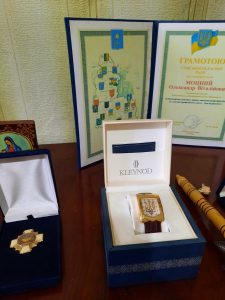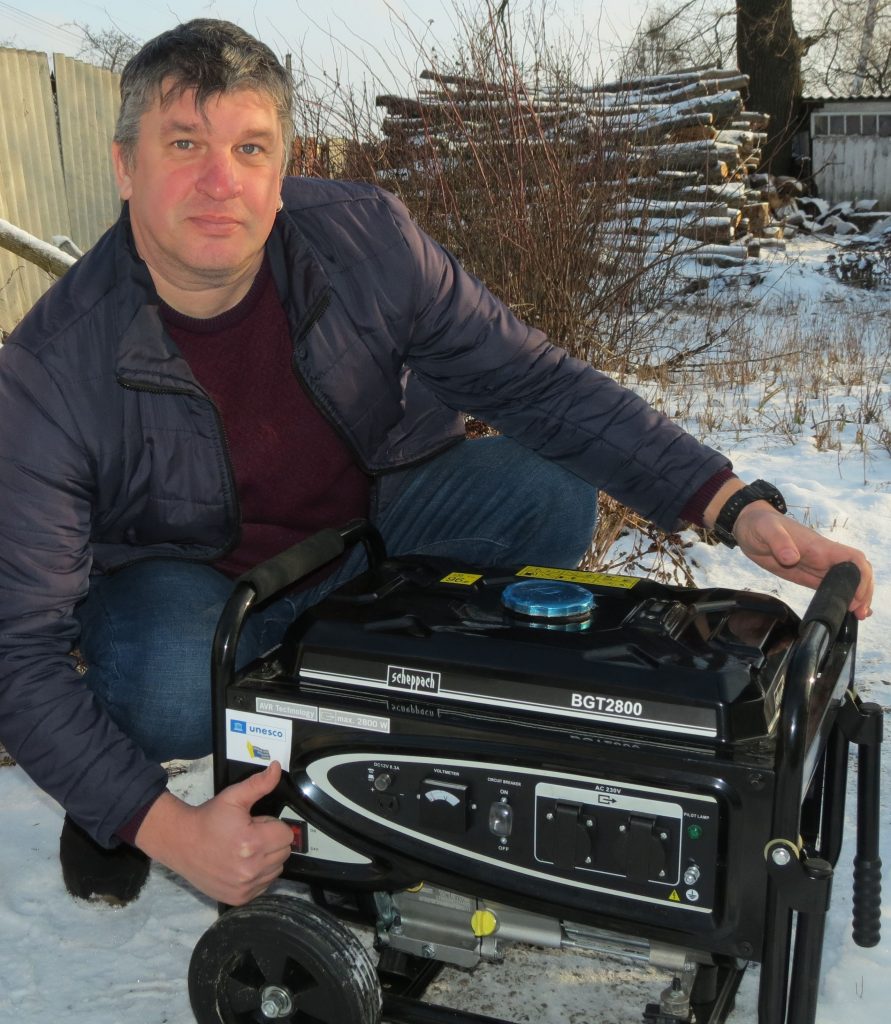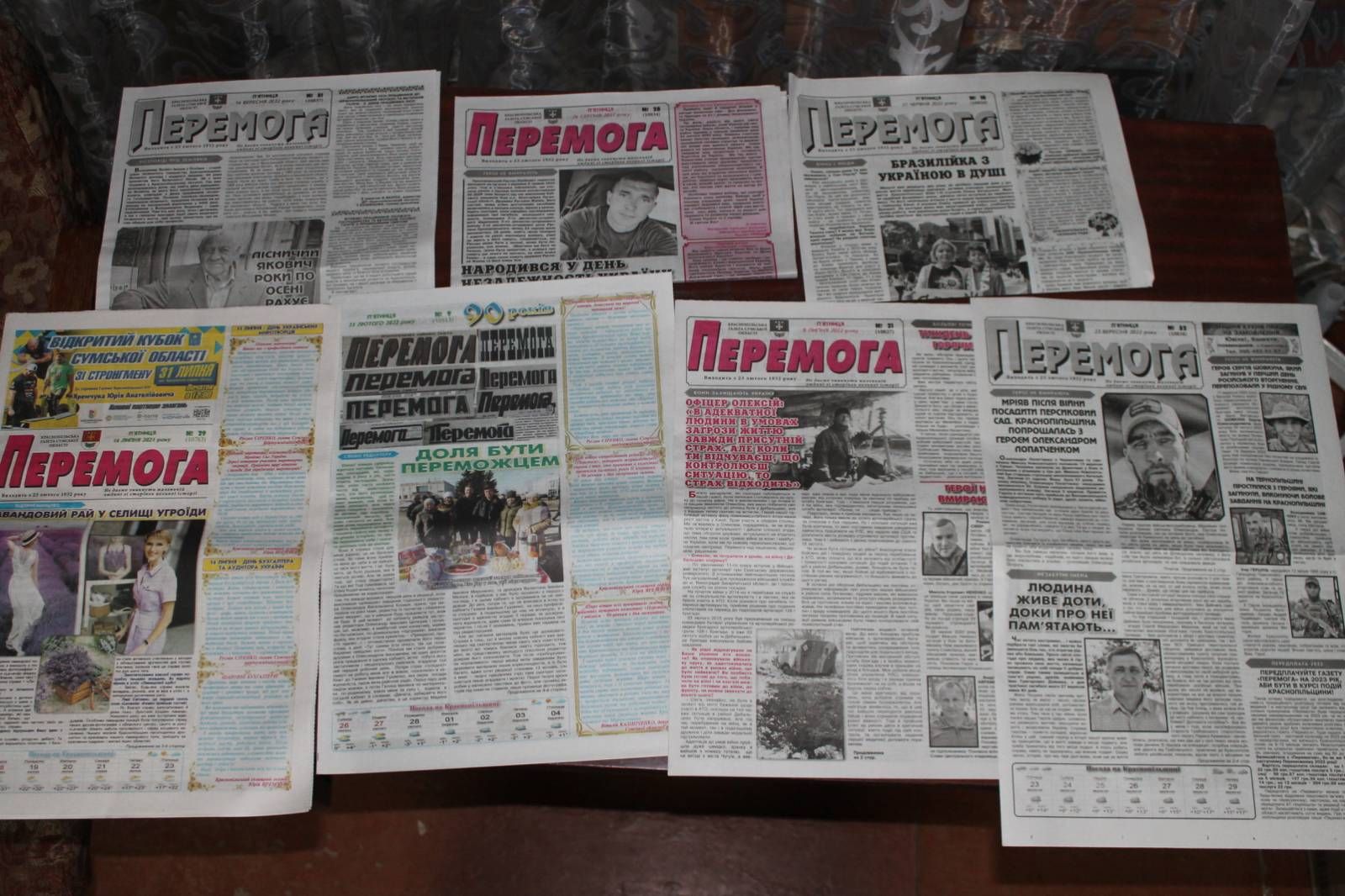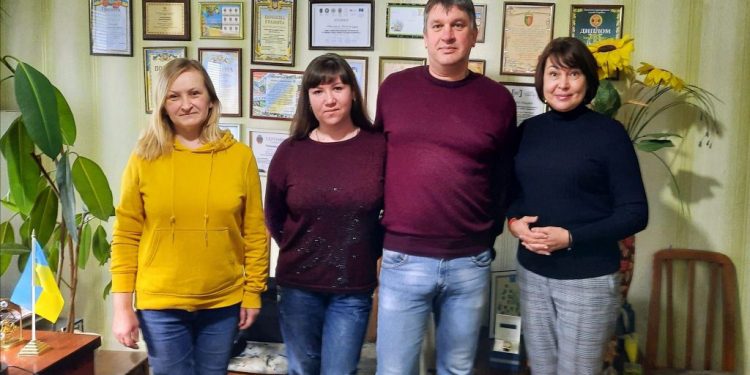Russian invaders entered Sumy during the early hours of their large-scale invasion on February 24, 2022. After initial shelling, they advanced towards Okhtyrka and Trostianets, engaging in fierce battles. Progressing further, the enemy reached Krasnopillia, establishing a checkpoint with three tanks at the entrance. This occupation lasted for almost two months.
After the liberation of Sumy, the chief editor of “Peremoha” newspaper, Oleksandr Motsnyi, traveled to villages, jotting down in his notebook the stories of locals about everything that happened during the occupation. Now, all these materials will be included in one comprehensive collection spanning all of Ukraine.
In Krasnopillia, occupiers roamed the streets, resorting to abductions and using civilians as shields during our forces’ offensive. Fortunately, the city was spared the atrocities witnessed in other Ukrainian cities and villages.
 “Liberators” looted shops, took helmets from a WWII memorial, confiscated agricultural machinery, and wreaked havoc in private homes in Krasnopillia. Some occupiers were disoriented about their location, expressing surprise at the lack of a warm welcome. In one village, they mistakenly thought they were in Luhansk Oblast and claimed to be protecting locals from Nazis. Rumors circulated that some units, realizing they were sent for combat, tried to return to Russian territory, wandering and hiding from their own forces.
“Liberators” looted shops, took helmets from a WWII memorial, confiscated agricultural machinery, and wreaked havoc in private homes in Krasnopillia. Some occupiers were disoriented about their location, expressing surprise at the lack of a warm welcome. In one village, they mistakenly thought they were in Luhansk Oblast and claimed to be protecting locals from Nazis. Rumors circulated that some units, realizing they were sent for combat, tried to return to Russian territory, wandering and hiding from their own forces.
People also share stories of how occupiers fled under the pressure of the Armed Forces of Ukraine and territorial defense fighters. They dressed in civilian clothing, hastily looting from the population, sometimes forgetting to retrieve their military uniforms. They fled on anything capable of moving—tanks, armored vehicles, trucks, cars, and even stolen combines.
Fighting the Russian occupiers since 2014
The Russians swiftly entered Krasnopillia, catching the editorial team off guard about the magnitude of the threat entering Ukraine. However, they quickly adapted. One of their first actions was removing the “Peremoha” newspaper sign from the wall. Since 2014, Oleksandr Motsnyi and colleagues actively volunteered, collecting and delivering supplies to the front lines, producing materials about soldiers. “Peremoha” participated in the “Reformed Press for the Ukrainian Army” project, self-funding newspapers for military units along with colleagues from Sumy publications. Motsnyi received honors for his volunteer work during the Anti-Terrorist Operation (ATO), keeping the awards in the editorial office. When the enemy arrived in Krasnopillia, all awards, along with documents, were safely hidden.
 Delayed Anniversary Celebration
Delayed Anniversary Celebration
On February 22, 2022, “Peremoha” celebrated its 90th anniversary, planning a festive celebration on February 25. They invited guests, purchased household appliances and two TVs for a lottery among subscribers (supported by sponsors). Prizes were prepared, but due to the invasion, they couldn’t be awarded on time. Everything collected was stored in the editorial office, hidden from enemy eyes.
As soon as Krasnopillia was liberated, people were invited in April to claim their prizes. People were reportedly shocked, not expecting that their prizes were preserved and could be claimed. This information was communicated through the anniversary issue of “Peremoha,” dated February 25, which readers received after the de-occupation. The prepared anniversary edition became a symbol of Ukraine’s resilience and victory.
Raffle Tradition Breaks for a Good Cause
The tradition of raffling prizes for subscribers was interrupted this year. The decision was made to redirect the funds intended for prizes to support the Armed Forces, contributing a small step towards victory.
A Year After Liberation: Life Changes, Sustained by Hope
Despite driving out the occupiers, the ongoing shelling near Sumy, close to the Russian Belgorod and Kursk regions, persists. Life endures, and, as proven before, a local newspaper is crucial, especially in times of informational scarcity during wartime—a symbol of stability and faith that everything will be fine.
“Peremoha” initiated subscriptions for 2023, with the editor-in-chief, Oleksandr Motsnyi, explaining:
— Before the war, our circulation was 3,000 copies, sometimes more. Now it has decreased to 1,500 copies. The most powerful agricultural communities were always near the Russian border, where people were relatively wealthier, so they subscribed more. Now, due to constant shelling, many people have left. The enemy ruthlessly destroys livestock complexes, agricultural machinery, farms, and residential buildings. They destroyed the tower, leaving people without mobile communication.
For those staying in shelled villages, funds for subscriptions are scarce, leading to almost a fifty percent reduction in the newspaper’s circulation. Despite the challenging forecast, there is hope for improvement. “Peremoha” relies on the support of Krasnopillia and villages farther from the border, conducting electronic subscriptions, which has a minimal economic impact. It’s gratifying to see our newspaper read not only in Ukraine but also in the USA, the Czech Republic, Poland, Canada, India, and beyond. The fact that people from abroad send funds to subscribe to the newspaper for fellow residents in Krasnopillia is doubly heartening. Their trust, sending money for multiple copies, and leaving the subscription at our discretion boost our motivation to work.
Challenges Persist: The Postal Service
One major issue that hasn’t eased is the postal service. The editorial office cites unreliable delivery by the mobile units of “Ukrposhta” [Ukrainian Post; Service]. When newspapers are left at local councils, stores, or elsewhere, subscribers often do not receive them. The lack of reliable delivery becomes more evident when considering cases like the sponsorship of subscriptions for families of fallen soldiers. Despite challenges, the editor expresses gratitude to the reliable printing partner, Press Corporation Limited in Vinnytsia.
Reliable Partner: Press Corporation Limited in Vinnytsia
“Peremoha” and “Spilnopillia” are printed in Vinnytsia at Press Corporation Limited. The decision to print there was economically beneficial, ensuring timely delivery without concerns about paper procurement and transportation to Sumy—the printing house handles transportation. The editorial team emphasizes the excellent print quality and on-time delivery.
The support of Vinnytsia residents was crucial when, immediately after de-occupation, the editorial team had to resume printing without payment from Ukrposhta. The printing house extended credit, allowing the publication to continue.
NUJU Assistance and Challenges
The National Union of Journalists of Ukraine (NUJU) played a vital role in providing assistance. NUJU purchased a generator for the editorial office, crucial during periods of limited electricity. The generator was a timely aid, considering the need to work at night when electricity was available for only a few hours—a challenging scenario with border issues, shelling, and curfew. The assistance from NUJU was especially appreciated, addressing the critical need for electricity amid challenging circumstances.
Editor’s Joy: Gifted Protective Gear and Financial Assistance
The NUJU pleasantly surprised the editor by presenting a bulletproof vest and helmet. He expressed:
— Previously, when I traveled to border villages to prepare materials, soldiers at checkpoints often took off their vests and helmets and lent them to me for the duration of the trip. Now I have my own gear! Isn’t that a reason to be happy?
Financial assistance also reached the editorial office, enabling them to stand on their feet and look at life with greater optimism.
— I have been an NUJU member since 2008. I always knew it was essential to submit membership dues to Sumy on time, among other responsibilities. We talked about problems, but somehow dealt with them ourselves. Suddenly, in a tough year for everyone, we felt such caring concern for our newspaper, both in the regional organization and in Kyiv. It’s hard to imagine the level of mutual support and attention raised internationally to receive such a response in Europe and the world, — said Oleksandr Motsnyi. He hopes that their collaboration with colleagues from abroad will continue even after victory, and that printed press will be heard in their country.
“Spilnopillia”: Bilopillia + Krasnopillia
The huge war forced them to adapt their usual work to new tracks. Together with Nataliya Kalynychenko, who leads the “Bilopilshchyna” newspaper, they decided to publish a joint newspaper— “Spilnopillia.”
“Peremoha” represents Krasnopillia, “Bilopilshchyna” represents Bilopillia, and together they created “Spilnopillia,” — Alexander jokes.
On a serious note, initially, there was a joint project between “Peremoha” and “Bilopilshchyna”—a grant from the International Research and Exchanges Board (IREX Ukraine) under the Media Partnership Program. Now, they jointly publish “Spilnopillia” once a month alongside their individual newspapers. This collaborative newspaper spans twelve pages in color, featuring interviews and stories about soldiers, information about mine dangers, and interesting community-related materials.
Challenges of Wartime Publishing: Adapting Content Layout
The editor of “Peremoha” mentioned:
— With the onset of the large-scale invasion, when we resumed publishing after liberation, we were forced to transition from our usual twelve pages in color to just four columns. A newspaper of this format cannot contain everything interesting that we want to share with the readers. ‘Spilnopillia’ solves this problem by taking all the interesting content for readers onto its pages.
This adaptation in layout reflects the challenges and constraints faced during wartime, where resources and publishing capabilities is limited. Despite these constraints, the commitment to delivering engaging and relevant content to readers remains evident in their efforts to collaborate and optimize the use of available space.
This series, titled Shot Freedom of Speech, is created as part of a project Drawing Ukrainian And International Audience’s Attention To Serious Violations Of Human Rights And Crimes Against Journalists And Mass Media By The Russian Federation, which is performed by the National Union of Journalists of Ukraine, with support from the Swedish non-profit organization Civil Rights Defenders.






JOURNALISTS ARE IMPORTANT. Stories of Life and Work in Conditions of War is a cycle of materials prepared by the team of the NUJU with the support of the Swedish human rights organization Civil Rights Defenders.
#CRD

 THE NATIONAL UNION OF
JOURNALISTS OF UKRAINE
THE NATIONAL UNION OF
JOURNALISTS OF UKRAINE
















Discussion about this post